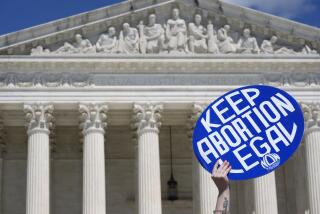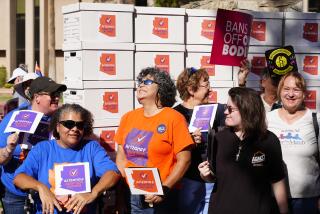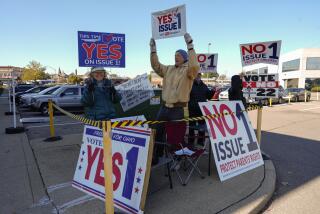Anti-Drug Mood in Oregon : Most Abortion Curbs Fail; Five States Pass Lotteries
Proposals to restrict abortion fared badly in several states, nearly final election results showed Wednesday, while voters on other state ballot initiatives endorsed lotteries to raise local funds and expressed concern over nuclear waste disposal.
In Rhode Island, Massachusetts and Oregon, measures that would have banned state-financed abortions were defeated. In Arkansas, where anti-abortion sentiment is strong, a similar initiative that also declared a fetal right to life was approved by only 1,598 votes of 617,000 cast, a 0.25% margin. Abortion opponents had expected to win handily in Arkansas, and had thought they had an outside chance in Oregon.
Abortion was among a number of issues addressed by 226 initiatives on the ballots of 43 states. The returns reflected an anti-drug mood in Oregon, where voters turned down a proposal that adults be allowed to grow and possess marijuana for private use, and conservatism in New Mexico and West Virginia, where measures guaranteeing the individual’s right to keep and bear arms were passed .
‘Right-to-Work’ Upheld
In one of the most hotly contested issues, Idaho voters confirmed the state’s right-to-work law, 54% to 46%, despite a $1.5-million AFL-CIO campaign against the measure. President Reagan and actor Charlton Heston had both made appeals supporting the law, which says, in effect, that union membership shall not be a condition of employment.
Labor officials had contended that the law would lead to low wages and fewer benefits for Idaho workers. Right-to-work proponents argued that Idaho needs the law if it is to attract new industry, and they accused the labor movement of economically damaging the state’s silver mining industry.
Five states--Montana, Kansas, Florida, Idaho and South Dakota--approved state lotteries, an increasingly popular method of paying for local services without raising taxes. State-run games of chance are now legal in more than half the 50 states.
North Dakota was the only state to defeat a lottery proposal. The Council of Churches strongly attacked it, and former Gov. Art Link campaigned against the initiative, saying a lottery was objectionable for social, economic, religious and legislative reasons.
Kansas Ends Prohibition
Kansas, in addition to approving a lottery, also voted to join the 36 other states that allow parimutuel betting on dog and horse races. Kansas also ended 68 years of prohibition, by voting to allow saloons to sell liquor by the glass. The vote leaves Utah as the only state with constitutional language limiting the sale of alcoholic beverages to private clubs.
In Vermont, an attempt to add an equal rights amendment to the state constitution was defeated 52% to 48%, although polls had once shown that 80% of the people would vote for it. Vermont was the seventh state to defeat such an amendment. They previously were adopted by 16 states; the last was Massachusetts, in 1976.
Environmental issues were on the ballot in several states. Oregonians, despite their reputation for placing life style above all else, defeated a measure that would have declared their state a “nuclear-free zone” and turned back another initiative that would have shut down the state’s only nuclear power plant, Trojan, until a site was found for its hazardous wastes.
In Washington, where much of the nation’s high-grade plutonium is produced, voters agreed to oppose federal attempts to make the Hanford Nuclear Reservation a nuclear-waste dump. New York and New Jersey approved bonds for environmental cleanups, and Massachusetts approved a measure to set a timetable for cleanups.
No Oregon Sales Tax
Oregonians also rejected a sales tax for the eighth time in 53 years, and defeated an effort to reduce property taxes drastically. Montanans decided to freeze, rather than abolish, property taxes, but Colorado rejected mandatory voting on new taxes and tax increases.
Massachusetts repealed its seat belt law, and Nebraska upheld a similar law.
Predominantly black sections of Boston turned down, 3 to 1, proposed secession from the city and formation of an independent city called Mandela.
More to Read
Sign up for Essential California
The most important California stories and recommendations in your inbox every morning.
You may occasionally receive promotional content from the Los Angeles Times.










